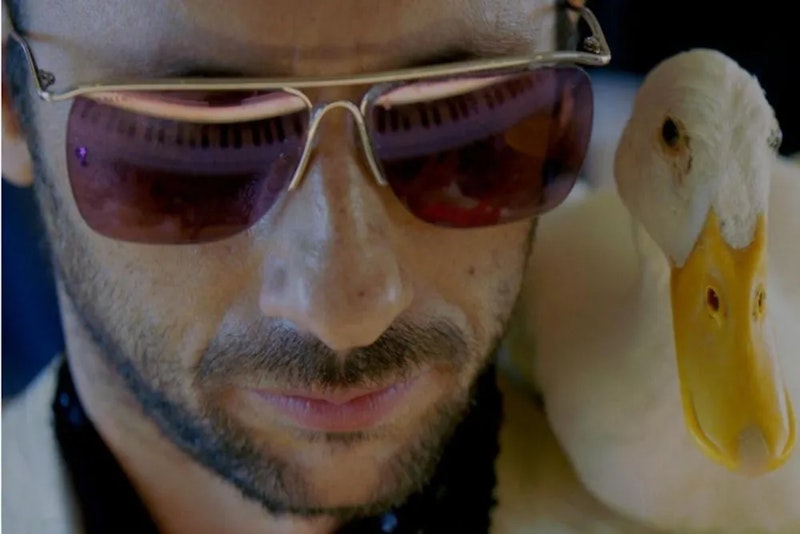At the Canadian premiere of Yes! in London, Ontario—a mid-sized city two hours outside the Greater Toronto Area—the latest film from Israeli, now Paris-based director Nadav Lapid was incorrectly introduced as "the first screening in North America.” It’s difficult to fault the programming team for this, as one would be hard-pressed to find that the North American premiere was at the Woodstock Film Festival in the Hudson Valley a week earlier.
Lapid previously won the Jury Prize at Cannes for his examination of his country’s solipsistic nationalism with 2021’s Ahed’s Knee. It remains Israel’s only win in any of the three major awards at the festival. Yet his latest film was reportedly blocked from competing for the Palme and relegated to the smaller Directors’ Fortnight sidebar—this year’s Competition lineup included no films from either Palestine or Israel. Just before the Cannes Film Festival, Lapid joined more than 380 filmmakers in signing a letter criticizing the industry’s silence over the genocide in Gaza. No major film festival in North America has been willing to touch the film, only quietly securing distribution with Kino Lober months after its release. For a work as radioactive as Yes!, it’s surprising to discover how much of it operates with such an assured sense of formal aplomb, yet limited in its admirable political ambitions.
Predominantly shot in Israel and based on a poem by Haim Gouri, Lapid’s latest satire follows the life of a musician named Y and his wife, Yasmin, who’ve grown accustomed to accepting every gig offered to them by those wealthy enough to help sustain their lives as parents of a newborn in Tel Aviv. When Y is commissioned to compose a patriotic anthem in the wake of October 7th—using updated and unsettlingly genocidal lyrics of Gouri’s original poem—we see him slowly unravel, confronting the contradictions of his nationalism and searching for salvation in a country that’s gone off the deep end.
The bacchanalia begins in the first frame. We’re thrust into an apocalyptic party among the elite of Tel Aviv as Y submits himself to multiple acts of degradation, cut to the sounds of La Bouche’s “Be My Lover.” For many, the sight of ass cheeks spread open to snort coke off of, threesomes with elderly ear fetishists, and a circle of literal bootlicking—recalling The Human Centipede—may prove exhausting and monotonous at a runtime of 150 minutes. But Lapid recognizes that the most unsettling satire is the kind whose insanity feels more grounded in reality than we want to believe.
Split into three chapters, the film releases much of its manic energy in the first third before turning outward. Y embarks on a side quest to the border between Israel and Palestine with an old lover who now works as a translator for the IDF. Lapid has mentioned shooting many of these sequences guerrilla-style, notably taking his crew roughly 500 meters outside the perimeter of Gaza, as Y angrily recites the updated Gouri poem in a blood-curdling wail: (“Within a year we will annihilate everyone, and then we will return to plow our fields.”) That the film exists is a testament to Lapid’s determination—production was plagued by funding pulled mid-shoot and multiple Israeli crew members walking off set due to its politics.
Lapid’s throwing everything at the wall. His camera spins in every axis, evoking structural experiments such as Michael Snow’s Cityscapes. His depiction of a society plagued by the internet recalls Radu Jude’s recent films, adding an urgent credence to the here-and-now of modern brain rot. Many scenes set in Tel Aviv have a quota of Israeli flags, much like how Hallmark holiday films are contractually obligated to include something Christmas-related in every frame. One could argue that seeing a nation so eager to display its flag—to the point of obsession—is one in the throes of an identity crisis.
The film, for all its admirable frustration, sets its sights on the collective delusion of the populace and the government’s desperation for legitimacy. Lapid, as in his last two films, presents only two possible responses: remain complicit or flee, as he did two years ago. The film is anti-Netanyahu but never manages to condemn the Zionism that caused this all in the first place or confront the concept of returning the stolen land to Palestinians—who are intentionally left offscreen for the entire runtime. Footage of atrocities appears only when the Israeli elite gather to watch it together, rendered through a flourish of phantasmagorical imagination.
Lapid’s constructed a film that’s radical for how brazenly it uses Israel’s own resources to critique itself, yet remains complacent in offering only an individualist answer to a collective catastrophe. We’re left with a daring film—one that should be watched and discussed—but also one that exposes the oxymoron of the so-called “Israeli Left.” What we’re witnessing here is a use of the master’s tools to merely renovate the master’s house.

